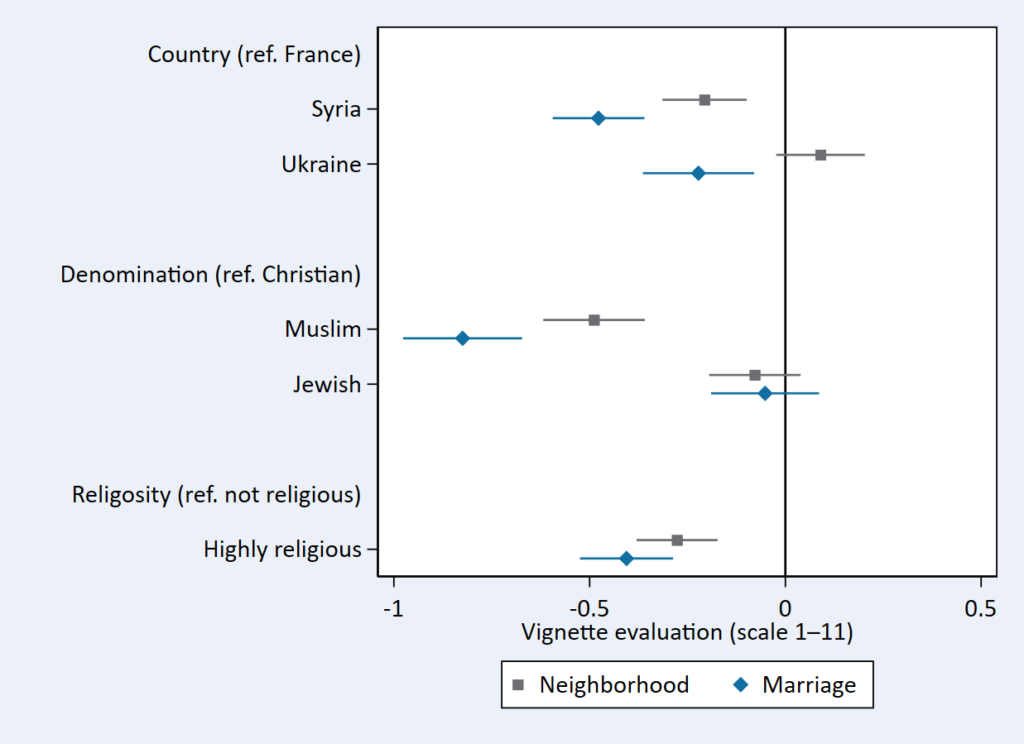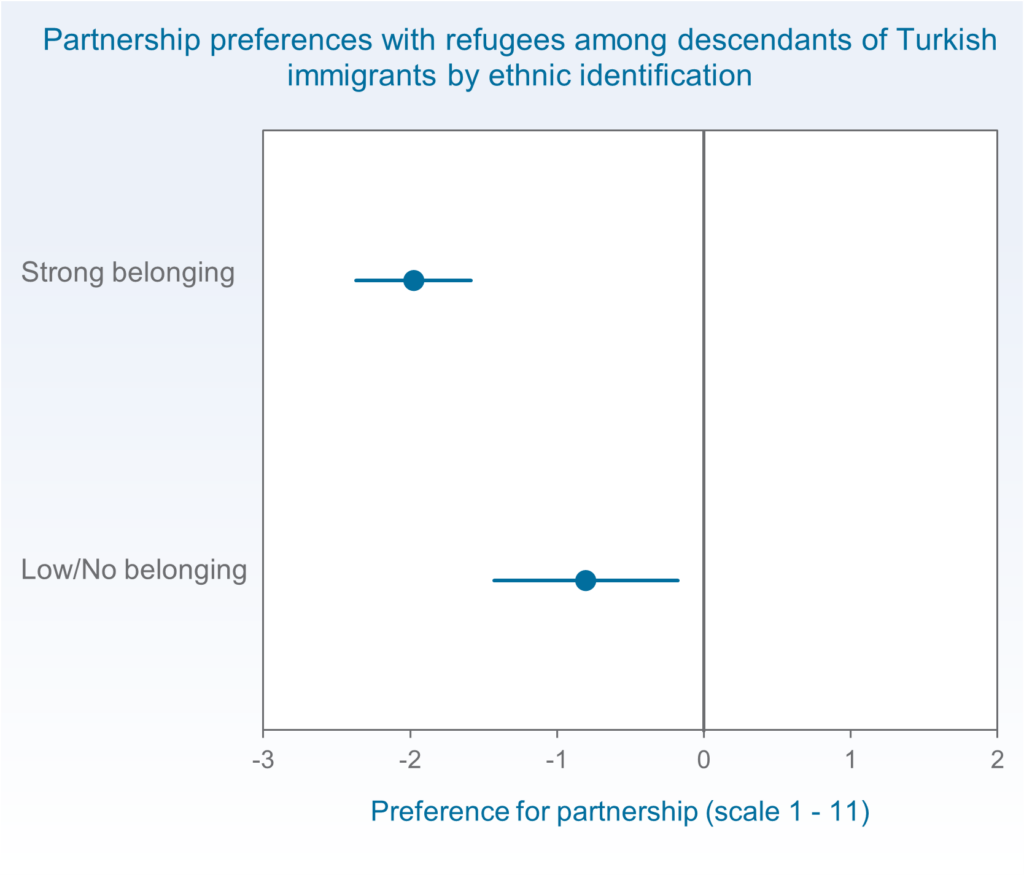Attitudes Towards Interethnic Partnerships with Refugees
In their new study, published in the Journal of Family Research, Jana Kuhlemann, Stefanie Heyne, and Irena Kogan use a factorial survey experiment implemented in the German Internet Panel (GIP, wave 58) to examine the attitudes of the German majority population towards interethnic partnerships with refugees. Respondents were presented with a hypothetical situation in which a relative forms a romantic partnership with a refugee and asked to rate how they would react to this. The experiment then varied the cultural characteristics of the refugee and the closeness of the romantic partnership.
Overall, the findings indicate a relatively high acceptance of interethnic partnerships with refugees within the German society. However, this acceptance depends on the characteristics of the refugees and the type of intimate partnership: Refugees with lower cultural distance to the German majority population, i.e., who are Christian, less religious, and possess higher education, are more likely to be accepted as partners. Contrary to that, we identified only small differences in the acceptance of partnerships with Syrian and Afghan refugees. Similarly, the general acceptance of partnerships tends to be only slightly higher for partnerships involving lower levels of commitment, i.e., non-marital partnerships, but our findings suggest an interplay between cultural distance and the closeness of partnerships: Refugees who are perceived as less culturally distant are more accepted as partners for respondents’ relatives, especially in high commitment partnerships such as a marriage compared to a casual non-marital partnership.
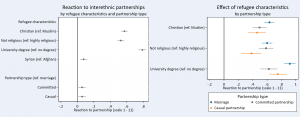
The role of family in partnership formation
In the study by Irena Kogan, Jana Kuhlemann and Amrei Perleth, published in the new journal Populations based on the PARFORM data, 41% of male refugees mentioned to have met their current partner through family. By contrast, only about 4% of native Germans reported the same, according to the CILS4EU-DE data. People with a migration background were only slightly more likely to meet their partner through family compared to native Germans. Even among those from Muslim majority countries, the figure stayed low—around 7.5%. It should be noted that the refugee data include only men, while the other groups comprise both men and women.
Frequency of meeting partner via family
Met current partner via family | |
Refugees | 41.25% |
Migration background from Muslim majority origin country1 | 7.56% |
Other migration background | 5.72% |
Natives (without migration background) | 4.08% |
Note: 1 Muslim majority origin countries encompass: Afghanistan, Albania, Azerbaijan, Bangladesh, Bosnia and Herzegovina, Cote d’Ivoire, Ethiopia, Gambia, Guinea, Indonesia, Iran, Kazakhstan, Kyrgyzstan, Lebanon, Northern Africa, Western Asia, Nigeria, Pakistan, Eritrea, Senegal, Sierra Leone, Somalia, Tajikistan, Tanzania, Turkey, Turkmenistan.
When refugees meet their partner through family connections, the couple is much more likely to share key cultural traits — such as nationality, religion, religious denomination, and language. In fact, when a partner was introduced by the family, the chances of being with someone from the same nationality increase by nearly 40 percentage points compared to couples who met their partner in a different context. Similarly, refugees who met their partner via family members are up to 25 percentage points more likely to be in a relationship with someone who shares their religion, denomination, or language, compared to those who did not meet their partner through family.
Similarity of partnerships in which a refugee met a partner through the family, percentage points, based on a multivariate linear probability model
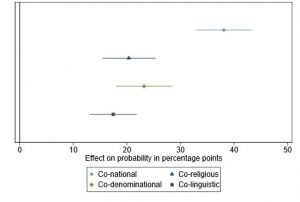
Religious Preferences in Partner Selection Among Young Adults in Germany
Results based on a factorial survey experiment show that shared religion plays an important role in choosing a partner. This is especially true for marriages and committed partnerships. Among Christians and male Muslims, preferences for a partner with the same religion were lower for casual partnerships than for marriage. However, for Muslim women, the preference for religious similarity remained strong even for casual relationships.
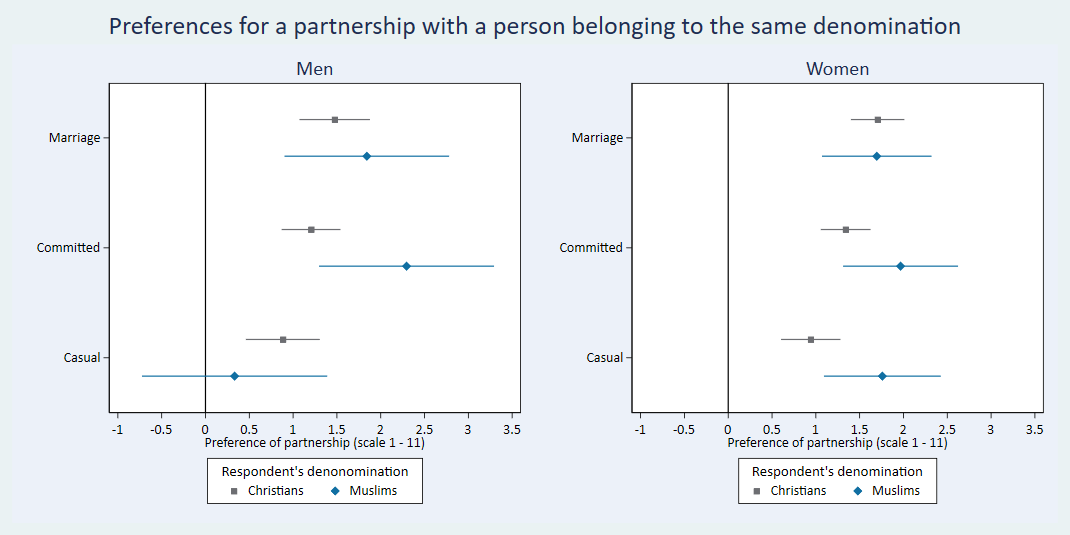
Some attributes of cultural distance tend to be perceived as stronger signals in situations involving closer social interactions with immigrants
In the study Cultural distance through the lens of social closeness and individual experiences with diversity: Unveiling attitudes toward recent immigrants in Germany using a factorial survey experiment” published in Soziale Welt, Stefanie Heyne, Jana Kuhlemann and Irena Kogan examine whether the impact of cultural distance—measured by the country of origin, religious denomination, and religiosity of a hypothetical immigrant—varies depending on the nature of social interactions. Specifically, they considered whether respondents would engage with this person in a closer or more distant situation, such as marrying into the family versus moving into the neighborhood.
The findings indicate a lower acceptance of Syrian immigrants compared to French immigrants in both scenarios. However, this effect is more pronounced when the immigrant is marrying a family member compared to when they are moving into the neighborhood. A similar pattern of weaker acceptance in cases of marriage is observed for Ukrainian immigrants, although they generally experience higher levels of acceptance compared to Syrian immigrants. Moreover, the study identifies a statistically significant lower acceptance of Muslim immigrants marrying into the family compared to those moving into the neighborhood, aligning with our expectations. Interestingly, this pattern did not extend to Jewish immigrants when compared to Christians. Lastly, it is noteworthy that highly religious immigrants receive similarly low levels of acceptance, regardless of whether the social interaction implies high or low levels of social distance.
Preferences of Children of Immigrants Regarding Partnerships with Refugees
A new study in the Zeitschrift für Soziologie examines the preferences of young people from the majority group and minority ethnic groups in Germany regarding partnerships with recent refugees from Syria and Afghanistan. On the basis of a factorial survey experiment implemented in the year 2022 in the 9th wave of the CILS4EU-DE data, Irena Kogan, Stefanie Heyne, Jana Kuhlemann, and Chadi Abdul-Rida demonstrate that young people in Germany are much less favourable to partnerships with refugees compared to partnerships with Germans, irrespective of whether the latter are born in Germany to German-born parents or whether their parents were migrants. Of all respondents, young people who either themselves or whose parents come from Turkey are most opposed to partnerships with refugees. Particularly those who tend to extensively consume Turkish media and those who identify more strongly with their origin country are more negative about partnerships with refugees.
